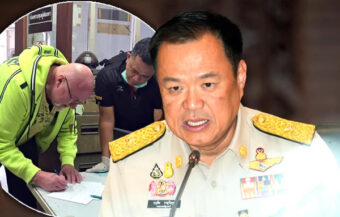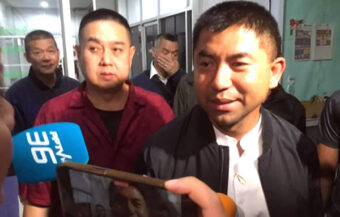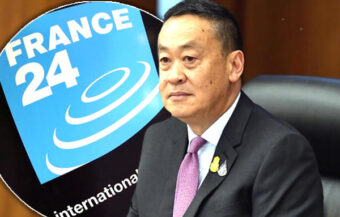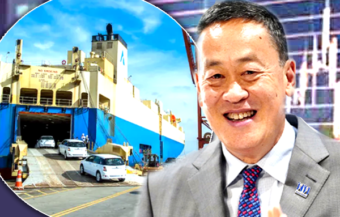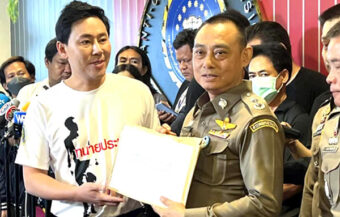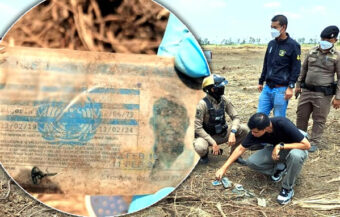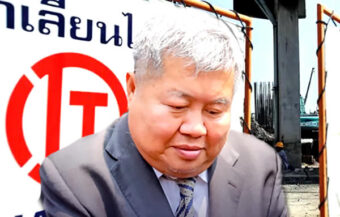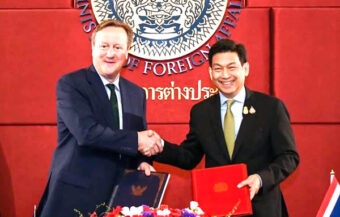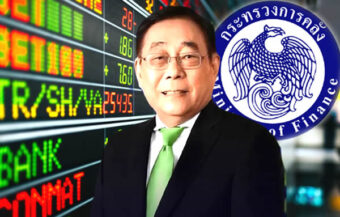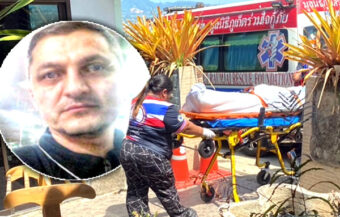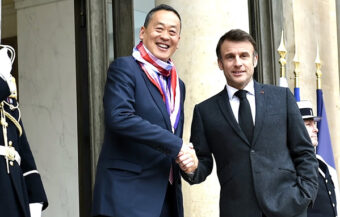Thailand’s wealthiest businessmen are putting their money where their mouths are in plans to help ‘revive’ the economy as it faces its bleakest hour. However, scientific information in the last 72 hours may point towards herd immunity coupled with a vaccine as the ultimate solution to the problem of allowing Thailand and the world economy to return to a life without personal restrictions. Thailand, a country that runs on exports and tourism, cannot accept anything less if it is to recover.
Thailand’s wealthiest businessmen have been sending reports and letters to Government House with schemes and proposals backed by cash pledges to help the country cope with the economic challenge whose scale has yet to reveal itself because of the Covid 19 virus catastrophe. One of the plans is from 34-year-old King Power CEO and Chairman of UK Premiership side Leicester City, Aiyawatt Srivaddhanaprabha. The young business leader proposes to use the famous football club to promote Thai tourism in the UK and worldwide while also streamlining and upgrading the country’s tourism offering through smartphone apps and health insurance against Covid 19. Despite the dark economic scenarios facing Thai authorities as the world looks like entering a severe U shaped Covid 19 recession, there is also some positive news in the last 72 hours on the medical front meaning that ‘herd immunity’ may ultimately be the basis for a solution.

Thailand is currently easing itself into its reopening phase as it continues to battle the coronavirus threat. However, the economic impact of this historic event is only just beginning.
Much depends on the medical outcome but leading economists believe that what the world is facing now is a U shaped recession as opposed to V-shaped such as seen after the financial crash where the recovery was quick.
It is anticipated that it will be 2021 before we see recovery from this human and economic catastrophe and there are signs of progress on the medical front suggesting that this may be possible.
In mid-April, Thailand’s Prime Minister Prayuth Chan ocha sent a plea for help to the country’s biggest business leaders asking them to come to the assistance of the nation with their ideas and proposals to help.
The initiative, backed up by a letter to over 20 top tycoons, has not gone unheard or without a response.
Billions of baht in expenditure being committed by top businessman to promote, develop Thai tourism
Although the PM later qualified that the invitation was not one urging Thailand’s richest people to hand over cash, many of the proposals that have been delivered to Government House involve billions of baht in expenditure on a range of projects.
The latest submission comes from King Power chief, 34-year-old Aiyawatt Srivaddhanaprabha who is the CEO of the Group and the Chairman of the Leicester City Football Club.
Spent ฿1.3 billion on supporting society in recent years, plans to now boost this to ฿1.47 billion
A submission from the company, this week, points to over ฿1.3 billion spent by the huge firm in the years to 2020. These include social programmes such as the provision of sports facilities to the youth sector and support for public health.
In the document, the company proposes to augment an existing budget of ฿749 million to ฿1.47 billion as it expands its efforts to do more for the national economy.
King Power offers to use Leicester City FC to promote Thailand as a tourism destination to the world
One key proposal is the use of the company’s UK Premiership Football franchise to promote tourism to Thailand in the United Kingdom and globally through the coverage of the premiership and the Leicester City team which famously won the premier league in 2015/2106 against 5000 to 1 odds.
For the 2020/21 season, the ‘Amazing Thailand’ brand will be displayed on the team’s jerseys while the crowds at the King Power Stadium in Leicester will be targeted by advertising for Thailand as a tourist destination on giant video screens.
Health insurance for tourists against the virus
The King Power boss sees Thailand’s tourism prospects taking 1 to 2 years to come back on stream and proposes health insurance cover for tourists against the virus.
The firm is also proposing the development of an e-visa system, the reorganisation of flight slots at Thailand’s airports and a range of apps for tourists to make visiting the kingdom a more seamless and enjoyable experience.
Red Bull empire offers to push self-sufficiency farming with ฿300 million fund for campaign
Proposals are flying into the Government House from the kingdom’s richest families and concerns.
Chalerm Yoovidhya and his family run the world-famous Red Bull drink which has developed into a colossal money-spinner over the last few decades around the world.
Mr Chalerm is consistently listed as one of Thailand’s wealthiest men.
The energy drink boss is proposing to fund a ฿300 million initiative targeted at poorer farmers which would aim to teach them self sufficiency techniques in farming.
Self-sufficiency economics pushed by King Rama IX and senior economists even at times of plenty
The philosophy is an old one that has been touted for nearly a century ever since the Great Depression in European countries and the 1997 Financial Crisis in Thailand.
It applies well to Thailand where ownership of the land is protected and limited to Thai citizens.
This has been a key factor in allowing Thailand, in past financial and economic crises to maintain stability. Many Thai people who lose their jobs in the big cities have the option of returning to their families or land holdings at times like this.
The philosophy, on a wider scale, was advocated strongly by King Rama IX and many senior economists before this crisis as a means to curb excesses even at times of success and provide for a fairer, more sustainable economic future and indeed society.
Already practised by many Thai farmers
The proposal being put forward by the Yoovidhya family would encourage farmers to adopt techniques that are already in practice among Thai households and farmers throughout the kingdom on a wider scale.
This involves growing crops for use by the family as well as other farm produce including livestock and even value-added products to help families become self-sufficient and conserve cash outlay.
The philosophy allows families to become more independent and less susceptible to external markets.
Plans to work with the Agri-Nature Foundation
‘We want to build food security for the nation,’ declares a letter sent by the Yoovidhya family this week. It plans to do this by working with the Agri-Nature Foundation over the next 3 years.
We want to support and mentor people who want to adopt the ‘sufficiency economy’ approach as their new path to life.’
‘New normal’ for life anticipated by Yoovidhya family
The family envisages establishing a ‘learning centre’ for farmers to prepare them for this new approach to farming and indeed to life.
It appears to anticipate that the Covid 19 virus and pandemic will usher in a ‘new normal’ which will see many changes.
‘Life in the aftermath of Covid-19 is uncertain and many changes will be unavoidable but this will help give birth to a new normal,’ the letter said. ‘Under the project, the family will turn part of its land into a learning centre to equip people with a self-reliant attitude.’
Chairman of huge conglomerate proposes ฿150 million fund to help farmers in Lamphun
The Chairman of Thailand’s PM group, Prayudh Mahagitsiri, who runs an industrial conglomerate whose activities range from offshore drilling to well-known consumer and retail brands including Nescafé, Pizza Hut and Taco Bell, has also come forward with a programme for assistance for the Thai government
His proposal is similarly targeted at the country’s farmers, the bedrock of Thailand’s economy.
He has proposed a scheme to purchase farming products from 5,000 farm holders in the northern Thai province of Lamphun.
A fund of ฿150 million will be used to stabilise the incomes of families in this area for 6 months while the tycoon has also indicated that money will be spent on using technology to begin the process of adding value to farming products at home.
True extent of the economic challenge yet to materialise bur recovery depends on a health solution
At the outset of this initiative from the Thai Prime Minister Prayuth Chan ocha, he said that his goal was that these successful and wealthy business people would play a ‘key role’ in helping to revive Thailand’s economy as it now faces one of its darkest moments with the true extent of the challenge yet to become visible.
From higher government debt to a massive increase in unemployment combined with sharp drops in export and tourism earnings, 2020 is going to be a tough year.
However, any recovery is dependent on overcoming this virus and the impediments to full trade. This requires a medical or health solution.
Some hopeful news on the medical fight against the Covid 19 virus this week as immunity is confirmed
However, with a greater understanding of the virus and accelerated progress in the development of tests and vaccines, there is also room now for hope.
One key breakthrough this week was confirmation by scientists in South Korea that effective antibodies from the virus exist and that it is highly unlikely that users can be reinfected.
In fact, South Korean scientists expressed a view that it is impossible despite persistent news reports.
WHO made this a contentious point last week
This became contentious last week when the World Health Organisation suggested that there was no reliable evidence that those who had recovered could not be reinfected.
However, Severin Schwan, the CEO of pharmaceutical giant Roche just today confirmed that it was now ‘very likely’ that such immunity from the disease develops in recovered patients.
The Roche topman had some exciting news.
Highly accurate and specific test for Covid 19 antibodies now developed and being produced
His company has developed a highly accurate and most precise test for antibodies which specifically reacts to antibodies from the Covid 19 virus.
‘This is so special about this test. It’s highly reliable,’ the Roche boss told CNBC.
He referred to earlier ‘molecular’ tests which gave false positives and it is now thought that this may be responsible for the confusion and fear caused by patients who were thought to have been cured testing positive again.
Mr Schwan’s company is already producing millions of the new, more accurate antibody test kits.
Herd immunity may yet be the answer
This, taken with the emergence of herd immunity in Stockholm, Sweden’s capital. That country did not impose strict lockdown measures and developments there may open the very real possibility that ultimately this natural process built into human beings may be the answer to the problem coupled with vaccination for those who are most vulnerable and treatment for those who fall between the stools.
Even WHO has now praised Sweden
Last week, Dr Mike Ryan, Executive Director of the World Health Organisation conceded that the world may yet have to look to Sweden when it comes to the future.
‘Sweden represents a future model, if we wish to get back to a society in which we don’t have lockdowns,’ the WHO’s Mike Ryan said.
This week, Sweden’s Public Health Agency estimated that up to 33% of people in Stockholm may now have immunity for Covid 19 while a key official revealed that he has already seen evidence that this is impacting the country’s infection rate or curve.
National states more effective than global organisations at dealing with this intractable problem
If this proves to be the case, it will be another indication of the increased strength, agility and capability of the national state as opposed to global or multilateral organisations.
Simply put, different countries doing different things is often a faster way to find the right answer to an intractable problem where there is no clear way forward that can be discerned or where there are many alternatives.
Sweden’s approach and experience, if the trends continue, will have served the world well.
Sweden’s response was not limited to herd immunity
The Nordic kingdom, it should be noted, does not describe its approach as one simply of herd immunity.
It points to clear guidance to its citizens as well taking practical steps to protect the most vulnerable particularly the aged and those in care homes where its response initially went awry contributing to a higher death toll.
While the country has a far higher death rate per 100,000 than its Nordic neighbours at 22 per 100,000, the figure is at least half that of Italy, Spain and the United States.
Further reading:
Government to control rollback of lockdown measures to reopen all businesses from May until July
Some shops and outlets to reopen in Bangkok but measures to be reimposed if infection rate rises
Government begins looking at borrowing options to fund huge ฿1.9 trillion economy rescue package
Government begins looking at borrowing options to fund huge ฿1.9 trillion economy rescue package
Virus may be partially airborne and Minister right in face mask fracas according to new US research
Health Minister in an outburst against western foreigners as 7 more are infected by the coronavirus





